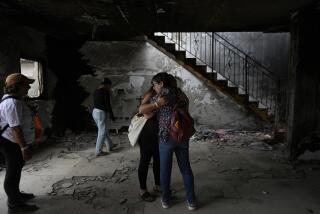What’s Worse Than Terrorism? Rejecting Peace
- Share via
Before the weekend atrocities in Jerusalem and Ashkelon, there had been a lull in major terrorist incidents as the Mideast peace process moved forward. But no one in Israel was fooled. It was only a matter of time before violent Arab rejectionists would strike again.
Indeed, the news Sunday was painfully familiar: Suicide bombs. Shocked bystanders. Blood on the street. Orthodox Jewish burial workers collecting body parts. And demonstrators shrieking at the prime minister, reflecting the question many Israelis asked themselves: What good is this peace process?
Yet in the midst of our grief and rage, it is vital for Israelis and their friends abroad not to succumb to the arguments of those who blame the peace process for these latest tragedies. Those who argue that the bombings would not have happened if Israel had retained control of the West Bank oversimplify and distort the past as well as the present situation. They are using the shock of the latest horrors to blur a grim but rather obvious historical reality: Terrorism has been endemic to the Arab-Israeli conflict, with or without a peace process.
It is easy to be fooled into thinking that conditions were once better. In Israel’s national memory, the years between the Six-Day War in 1967 and the Yom Kippur War in 1973 were a time of heady confidence and security. Yet roughly 2,200 Israelis were killed in terrorist attacks and military action during those years. Even when Israeli security forces had a network of Palestinian informants in the West Bank and the most advanced intelligence techniques in the world, the atrocities did not stop.
These facts should be kept in mind the next time critics of the peace process cite statistics about the number of Israelis killed by terrorists since Israel and the Palestinians reached their first agreement in Oslo in 1993. The response to new tragedies should not be a historical amnesia about old ones. Throughout this century, any change in Arab-Israeli conditions, any progress toward accommodation in this conflict has been greeted by murderous terrorism.
What Israel should not do now is give the terrorists precisely what they want by halting the peace process. Rather, Israel should demand that the Palestinian Authority meet its responsibility to stop the terrorists. Although he strongly condemned the latest bombings, the onus is on Yasser Arafat to reassure Israelis that he has both the will and the power to root out terrorists. Prime Minister Shimon Peres and Foreign Minister Ehud Barak have rightfully made it clear that Israel will accept nothing less.
At the same time, it would be a mistake to forget that the peace process has created new opportunities to fight terror that must not be relinquished. The objective reality is that the Palestinian Authority has been working closely with Israel’s security services to stop terrorists. The outgoing head of the Shin Bet recently told the Knesset that the Palestinian Authority had located and dealt with 80 potential suicide attackers in the past year.
For decades, when Israeli and Palestinian forces waged war with each other around the world, there seemed to be no hope for ending the cycle of terror and recrimination. Now, Israel has finally had a taste of real hope; we must not let it be dashed by a few suicidal fanatics. From 1967 to 1994, while continuing terrorism took 573 civilian lives in Israel, there were 10,984 Israeli military fatalities. Only a successful peace process will enable Israelis to wipe away a danger far greater than terrorist acts: interminable war.
More to Read
Sign up for Essential California
The most important California stories and recommendations in your inbox every morning.
You may occasionally receive promotional content from the Los Angeles Times.













